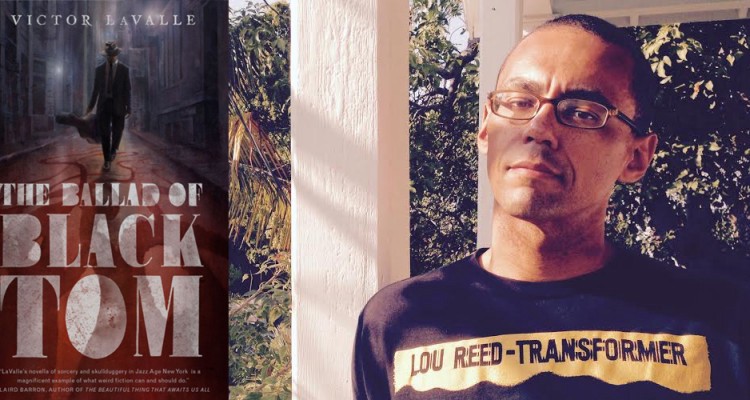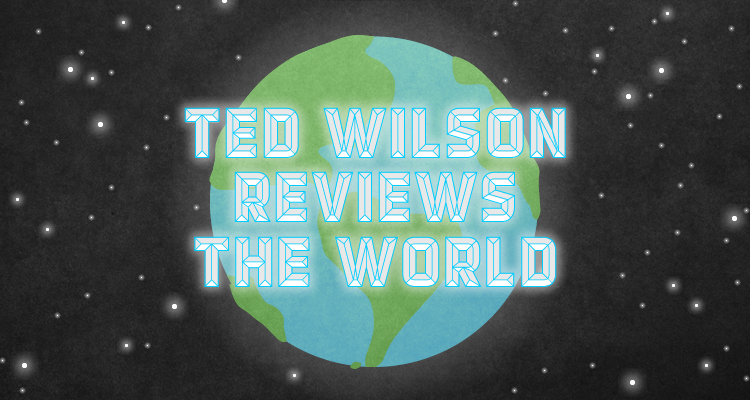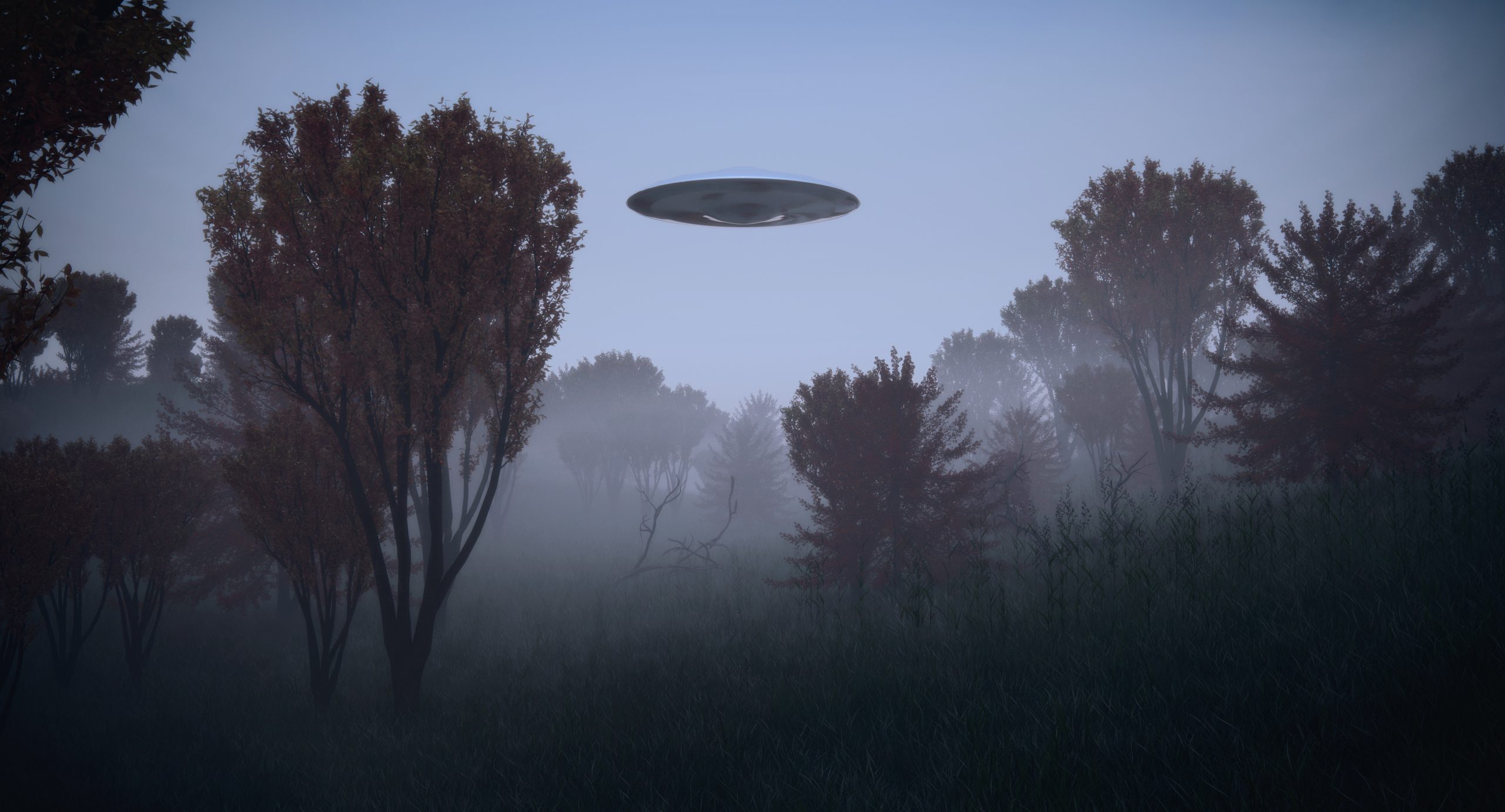interviews
Victor LaValle Talks About Horror Fiction, Imaginative Illiteracy, and Lovecraft’s Complicated Legacy
The author on his new Lovecraft-by-way-of-#BlackLivesMatter novel "The Ballad of Black Tom"

Earlier this month, I had the pleasure of talking to literary horror writer extraordinaire, Victor LaValle, for Vice about his new Lovecraft-by-way-of-#BlackLivesMatter novel The Ballad of Black Tom. Our conversation went on so long, we decided to split it in two, with the second half appearing here, in Electric Literature.
LaValle, who straddles the border of genre and literary fiction as well as any contemporary writer, is the author of several books, including The Devil in Silver and Big Machine. The Ballad of Black Tom, is a tightly-written horror thriller that works as both an homage and a rebuttal to H. P. Lovecraft. You can read our Electric Literature review, by Tobias Carroll, here.
In this interview, I talked to LaValle about the status of horror fiction, the different legacies of Lovecraft and Tolkien, and the “imaginative illiteracy” of people who don’t read genre fiction.
Lincoln Michel: First off, I really enjoyed the book, and I’m excited about it coming out. What was the genesis of the project?
Victor LaValle: I’m still in shock over the life that this book is having. It started out as just an itch I wanted to scratch last summer. I had turned in the edits for my novel and was waiting to hear back from the editor, and I was just itching to write something. So I knocked this thing out in that month. Like the first draft. I went to my wife and I said, “Nobody’s going to want this shit. Who wants a literary mashup of H.P. Lovecraft with a black lives matter undercurrent?” She was just like, “Well, don’t delete it.” And I really just thought that it wouldn’t find anybody who would think this combination is as interesting as I do. When I wrote it, I really thought, “Well, maybe I could post this online somewhere for free, people could just check it out?” But over time, people kept saying, “Oh, I like this! We should publish this.” I said, “Okay, that sounds great.”
LM: You’ve said you wrote the book during “the last round of arguments about H.P. Lovecraft’s legacy as both a great writer and a prejudiced man.” This includes the fight over having his bust removed as the trophy for the World Fantasy Awards, which they just decided to do.
VL: Smartly, it seems like they are going to go with a choice that’s not a specific person. I hope that’s what they do. Because any person’s legacy is going to age and potentially sour. But an idea or an image or something like that is much better. Like Cthulhu, I think, has much more of a lasting life than Lovecraft. Or could mean more for longer than Lovecraft personified.
LM: Right, because that references the work as opposed to the man. Lovecraft wasn’t all that popular in his day, yet he’s grown to be this huge influence not just in horror, but in the culture at large. In an interview in Dirge magazine, you attributed that in part to what you called the “open code” nature of his work. Why do you think that that made it so enduring?
VL: If you read his stories over time, he himself didn’t have a singular idea about what the Old Gods were, who all the Old Gods were, what all the conspiracies in his universe were. It was constantly changing, and so as a result, you as a reader can feel like, okay, this is constantly evolving and shifting, it never feels fixed. Then he dies and one of his confidantes, August Derleth, goes on to publish Lovecraft’s work partly in an effort to make people know and remember how great Lovecraft was. Then he starts writing these Lovecraft Universe stories, but Derleth starts shaping things into much more of a Judeo-Christian narrative. And that’s not really something that Lovecraft seemed to be pushing. That’s Derleth. And so it was almost like right at the beginning of his legacy building you have people saying, “I’m gonna try my hand at this.” And if one of his closest friends, the one who’s trying to get his legacy out there, feels the right to do that…well, why not everybody else?
LM: And even in Lovecraft’s day, he had a circle of friends including Robert E. Howard, who wrote the Conan the Barbarian stories, that would share elements and borrow names from each other. So even in his day, he had a collaborative process.
VL: I think that’s right.
LM: It’s very different from the modern geek culture notion of pure canon, and how everyone worries about what’s “true” or what “counts” in fiction.
I wonder too if there’s a way that the spirit of the creator telegraphs how we’ll take things.
VL: I wonder too if there’s a way that the spirit of the creator telegraphs how we’ll take things. A fine example would be Tolkien. It seems to me that the point of his output was to be definitive about his worlds, and it didn’t seem like he was in collaboration with anybody. Tolkien was simply producing and creating that really huge world of his. I might be wrong about that, because I don’t know that much about Tolkien, but that spirit seems very different than Lovecraft’s. I wonder if it even comes down to how someone like Tolkien was this Oxford don who’s very used to authority and what I say goes and being left to his own devices, and then you have Lovecraft not coming up through this system where he is taught that he is somehow the authority or the final word on anything. And as a result maybe lives and dies by those collaborations. He does live and die by his letter-writing to all his friends. And so maybe that makes for a much more relaxed way with your work and conversational letters about your work.
LM: That seems right about Tolkien. He doesn’t really leave many gaps, and even when there are bits of mystery in the Lord of the Rings, he has The Silmarillion, which is an encyclopedia that fills out every detail.
Lovecraft is typically classified as Weird Fiction, a genre that’s having a moment right now with Jeff VanderMeer’s Southern Reach trilogy, Penguin Classics reissuing those Thomas Ligotti books and several other Weird Fiction writers seem to be getting a lot of attention. You’ve said Weird Fiction was the first genre of literature you fell in love with. Can you talk about its influence on you?
VL: When I was younger, I didn’t understand that I was falling for Weird Fiction, but I gravitated towards Lovecraft, Arthur Machen, Algernon Blackwood, Shirley Jackson, Angela Carter — folks whose work was not about necessarily here are all the answers to how the world works or what these horrors are. They were much more about a sort of mood and a suggestion. I liked the stuff that suggested things are beyond our reckoning, human beings are limited beings and we can’t grasp or fathom everything that this universe has to offer. I just was drawn to that. It’s how I still view existence. One writer not in that list above is Stephen King, who was also a formative influence on me, but he can do the whole spectrum from splatter to realism to the genuinely weird.
LM: Yeah, because Lovecraft was a big influence on King too, right?
VL: I think he’s said that’s so, more than a few times. One of the greatest books that he ever produced was It, and that seems to be his great Lovecraftian/Weird book. At the end, when he starts explaining how there’s turtles and there’s stacks of turtles and the way we stack cosmic turtles is that all the boys have sex with this one girl, it was like…what in the fuck am I reading? This is just nuts, this is so weird.
LM: [Laughing] That’s definitely one of his weirdest endings.
VL: But nobody I know who has read and loved that book, or even read and hated that book, has ever forgotten the feeling of that last confrontation down in the caves. There’s the sex, but also the cosmic turtles and the deadlights. It doesn’t make sense, but it isn’t nonsense.
LM: Speaking of genres and moving between genres, it seems like it’s kind of popular wisdom that all of these genre barriers have come down in the last ten years and you almost expect big literary writers like Ishiguro or David Mitchell or Cormac McCarthy or whoever to write genre crossover books. That said, I get the impression that it’s still a lot easier to crossover writing literary science fiction or literary detective fiction than literary horror. Does that seem right to you and if so, why do you think horror has such a bad rap in the literary world?
I’ve told some folks I’m a literary writer trying his best to become a horror writer and they’ve practically shaken me to stop me from saying such a thing.
VL: It may be as simple as a lot of the people who are in the literary world read science fiction when they were young. If they dabbled in a genre it was that one. And if they liked it then, well, it can’t be entirely bad. That kind of self-centeredness. I just feel I talk to people sometimes and they’ll say, oh you know I read Ursula K Le Guin or Atwood or whoever you wanna name and they’ll say that at a certain stage those people really spoke to them so now they can still appreciate it and even applaud it. But the horror genre’s reputation precedes it. Even just the term “horror” creates a sense of revulsion in many people. I’ve told some folks I’m a literary writer trying his best to become a horror writer and they’ve practically shaken me to stop me from saying such a thing. “Don’t talk like that!” But since I’ve loved the stuff since a young age — and since I know a great many works of high literature are actually works of horror — I never understand this reaction.
LM: It’s interesting to me, because — and I also obviously love horror — there’s a certain way in which horror is almost the most literary of the genres. It comes from like Gothic fiction like the Brontës and down through Edgar Allan Poe. Its lineage is all these people who are firmly in the literary canon. I’ll probably get flack for saying this, and using “literary” is always problematic, but I feel like a lot of horror writers are just more literary in the sense that they tend to pay more attention to language. Because so much of the horror itself comes from the style and the atmosphere, and I feel like there’s a much greater focus on that, at least historically, than in a lot of old fantasy and sci-fi.
VL: Sometimes I wonder about what people come to a book for. If you’re not trained to love all that world-building that they do in fantasy or sci-fi then you might not find all that much to embrace or enjoy. Similarly, if you don’t want to immerse yourself in that mood then quite a bit of horror simply won’t be interesting because you can’t read horror for the explanations. Most horror makes no fucking sense at the conclusion. But if you love that mood, that language, then you shrug that stuff off. It’s like how people who love literary realism don’t mind the characters just sitting around introspecting for four hundred pages.
LM: [laughing] Yeah, I mean that’s one thing that’s kind of interesting about the genre discussions, is that people forget that genres are not like fixed immutable things that have always existed. They live and die and get absorbed by other genres. There was a time when the Southern Gothic was a real genre, even with its own pulpy covers and readership, but it died out and only a few really great ones — like O’Connor and Faulkner — got absorbed by the literary world. Then they just got a new label.
VL: Right, once they get taught, they get the stamp.
LM: Well, speaking of that divide, you know one thing that I’ve seen you do a lot, especially on Twitter, is you talk about the literary world’s inattention to plot. I remember there was one tweet I looked up. This was around Christmas, you said the greatest gift Santa could have given any literary writers this year is plots. Why do you think that literary writers don’t see plot as as essential a tool as voice or character or anything else?
I’m convinced the main reason literary writers are somewhat averse to plot is because most don’t know how to write one.
VL: You know, I’ve been teaching for going on fifteen years and I’m convinced the main reason literary writers are somewhat averse to plot is because most don’t know how to write one. It’s actually as simple as that. Maybe a more generous way to put it is that they have less interest in such things. Instead their focus is on the sentence level. A beautiful sentence may matter more than a memorable plot. But if we’re going to give shit to writers in other genres about their lackluster language or their wooden characters then why wouldn’t we tell the literary realists to get these human beings out in the world and do something?
LM: I mean, I love a lot of writers like that, but they’re normally short story writers.
VL: Maybe the true form of literary fiction is the short story. Because you can manage that over the course of a story, and have it be transcendent. Over the course of a novel, it can become deadly. And in fact a novel that’s only an accumulation of beautiful sentences risks becoming incoherent. You read along thinking, “This is an amazing two page description of a tree, but what the hell are we doing at the park again?”
LM: Especially if your goal is to create this powerful feeling or atmosphere, that’s going to get diffused after a while if that’s the only thing going on in the text.
VL: That’s right, and even the idea that one would modulate your tone and change the mood, then you have to pay attention to more than just sentences because you have to think in blocks, paragraph by paragraph, how to modulate things. Then section by section, and if you talk about novels, chapter by chapter. And that’s where the literary mind can stumble. Because they don’t seem to think bigger than that single block of pages, and that’s the whole point of plot. It’s the tether that you use four yourself and for the reader. It’s how you don’t get lost wandering in all those perfect sentences.
LM: I wonder if part of that is, you know you’re talking about teaching and you know like the way literary fiction is taught is so geared towards the short story, just because it’s easier to read and critique in a workshop. And then like we just don’t talk about the novel structure as much, at least in my experience.
VL: This is the second time I’ve been doing a year-long novel at Columbia, and I’ve been really happy that the department agreed with me that this was a need. It’s not for everyone, but for some of the students it’s been vital. And there is something powerful about reading 200 pages, 300 pages over the course of a year, reading that together as a group, and when you look at it in full, you really can think broadly about the book as a book. Bigger conversations than you can achieve reading 25 page submissions three times in a semester.
LM: I don’t know if this is a weird question, but a lot of people will just say that genres are purely artificial labels, that are just there for marketing and they don’t mean anything, and then a lot of other people will say that you know, genre snobbery is something that we should do away with, but the genres themselves are kind of important and distinct traditions and they’re not just artificial boundaries. Do you agree with one of those, or both?
Most people don’t want to bother, but they blame the genre categories rather than themselves.
VL: There’s this great term called “imaginative illiteracy.” It was coined by an academic named Northrop Frye. He explains that people are trained to read the genre they’re introduced to and lack training in the genre to which they’re not exposed. It seems simple but it isn’t. Every genre contains a great deal of complicated signs and symbols but if we read them for long enough we learn to become literate in those signs and symbols. As a result we can more easily enter into these genres and enjoy the stories inside. This holds true for realism, horror, romance, historical fiction, everything, since reading any kind of story is an act of imagination. Even the most plainspoken realist is still just making a bunch of shit up and trying to get you to picture all of it in your head. If you’re well read in a certain genre then you no longer notice how much imaginative literacy you’ve mastered. You’ve become a native speaker. But it isn’t automatic, it wasn’t effortless. So I don’t know if the genre labels are meaningless or aimed solely at commercial concerns, but I do know that you have to learn how to read different stories differently. This might be why so many people fall in love with certain genres when they’re younger and then don’t really leave those lanes. Even if the level of sophistication in the books increases the literacy required doesn’t and that’s fine for many. The problem is when such a reader is given something entirely different. Then it’s like being introduced to a foreign language. I can’t imagine someone saying, “Portugese just isn’t for me.” Or, “I don’t know why, but I never liked Mandarin.” Instead a person would say, “I don’t know how to speak Portugese.” Then they would either learn it or not. “Imaginative illiteracy” is a way to approach the same idea across genres. I like that explanation for genre divides much more than any other because a person can learn a new language if s/he wants to work at it, and a reader can learn how to be literate in other genres if they want to go to the trouble to become proficient. Most people don’t want to bother, but they blame the genre categories rather than themselves.
LM: I like that phrase, “imaginatively illiterate.” That makes a lot of sense to me. I remember when I was in workshop, often if I wrote something that was kind of in the tradition of weird fiction in some general sense and the tradition of weird fiction or the tradition of Kafka or Kobo Abe, there would always be a few students who could only understand it as “satire.” If it wasn’t realist fiction, but it wasn’t fantasy or SF, it had to be satire. And I also feel like I see genre people who really come from like the fantasy and sci-fi world are often baffled by writers who kind of have some of those elements but don’t really care about world-building. They’ll always ask questions like, “What are the rules to this world?” and the write is often like, “It’s like a four-page story, there’s not really a world or rules…”
VL: [Laughing] Right. And what I like about that imaginative illiteracy term is that it basically lets no type of reader off the hook. I mean lots of stuff is just bad, but if you’re imaginatively literate in that genre you can explain why rather than dismissing it because of its genre. You can see this even in professional criticism or book reviews. A book is crossing between literary realism and some other genre, and the reviewer’s intro is essentially saying, “Now this is a little outside my wheelhouse, but this person is pretty famous, so I guess gotta review it.” Then they write, “I just didn’t get why Ishiguro had to talk about dragons. He should stick to butlers.” Or something, you know what I mean? That’s not a review! You did not review his book. You just said you don’t like reading about dragons.
LM: Yeah, and then whenever those kinds of books come out you get like, the opposite, you know the one reviewer will be like all the literary elements worked in the fantasy don’t and the next reviewer is like all the fantasy worked because I really like fantasy, but didn’t like the literary stuff.
VL: “Why did Ishiguro have spend so much time talking about this old couple? Couldn’t they just go fight the dragon right away?” No! No they could not. Maybe in the end the real point is that each of those sides, all of the sides, is often saying, “Can’t you just give me something simple?” And the right answer to that is, “No fucking way.”








